A PANEL DISCUSSION ON CELEBRATING AFRICAN WOMEN, March 17, 2024, PART 2
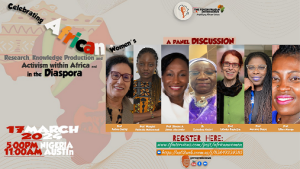
African Women’s Research, Knowledge Production, and Activism within Africa and Diaspora
(This is the first interview report with a panel of African scholars on March 17th, 2024. For the transcript, see YouTube https://www.youtube.com/watch?v=Q2L7LcoNpRE)
There is no history without records, whether the records be oral or written documentation. Most historical records have not been so kind as to accurately or completely capture the deeds and importance of women in society. Yet, a deep dive into the annals of history will not fail to reveal the historical importance of women in the evolution and expansion of the human race. Coming back home to Africa, there are matriarchal societies whose societies revolve around women and other communities whose histories do not fail to recognize the importance of women.
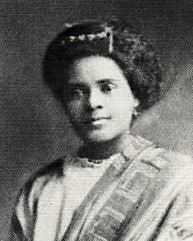
Photo: Adelaide Casely-Hayford
The past few centuries have seen more and more women rise to the occasion of going against the grain and tackling the status quo head-on. Even though oral traditions and glimpses into pre-colonial societies might be sparse, they reveal the integral role women played in knowledge creation and transmission. African women were not only the custodians of oral histories, the keepers of medicinal knowledge, and the bearers of cultural practices but were equally intimately involved in generating and producing knowledge in these domains.
The entry, stabilization, and rise in significance of African women in the African academic world — contributing to research, knowledge production, and activism — has been nothing short of spectacular. The steady rise would not have been possible but for competence, resilience, support, mentorship, and collaboration among and by pioneers whose contributions have transcended generations of academics. Through their scholarly pursuits, African women have contributed to the advancement of research and knowledge production on the continent, been instrumental in the dismantling of stereotypes, contributed to the study of inclusive historical narratives, and have helped rectify historical misrepresentations.
There will be no celebrations of the contemporary accomplishments of African women in research and knowledge production without a historical examination of the contributions that formed the foundation for the interdisciplinary studies championed by women researchers. While written historical records of African women’s roles in knowledge production and preservation might be sparse, oral traditions, archaeological information, artistic expressions, and artifacts from the past provide glimpses into pre-colonial societies that reveal the integral role women played in knowledge creation and transmission.
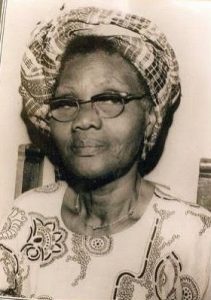
Photo: Funmilayo Ransome-Kuti
Furthermore, there is the colonial era, in which, despite restrictions on women and girls’ access to education, African women participated in knowledge production and activism. Despite the barriers, some women defied societal expectations and emerged as early pioneers in research. Notable figures like Adelaide Casely-Hayford of Sierra Leone and Funmilayo Ransome-Kuti of Nigeria navigated the constraints of their time to contribute significantly to intellectual discourses.
Furthermore, the activism of Winnie Mandela and the women at the Aba Women’s Riot, among others, served as women’s contributions to the independence movement and the resistance to oppression and forced leadership (colonialism) across several African countries.
Given the imposition of Western educational structures during the colonial era — where the educational systems created in African countries fully reflected Eurocentric ideals — there was widespread marginalization of indigenous knowledge production and distribution, thereby causing the new reporters and recorders of African history to quickly sideline the perspectives, narratives, and histories of African women.
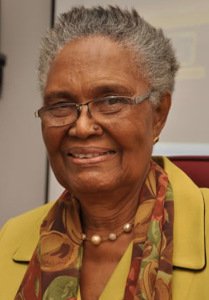
Photo: Grace Alele-Williams
Even in the face of systemic challenges, African women persisted and stayed resilient. Starting from the mid-20th century, educational opportunities began to open up, allowing more women to enter academia. This period marked the emergence of the first generation of female African academics, who laid the foundation for women-focused scholarly research on the continent.
The latter half of the 20th century witnessed a notable surge in the number of African women entering academia and contributing to various fields of research, and with the surge came the need to navigate institutional challenges and confront social expectations of balancing familial responsibilities with academic career pursuits.
Pioneering scholars like Grace Alele-Williams, the first Nigerian woman to earn a doctorate and later the first woman to become the Vice-Chancellor of a Nigerian university; Bolanle Awe, a celebrated professor of history and women’s studies; and Wangari Maathai, the Kenyan environmentalist, and Nobel laureate exemplify the indomitable spirit of African women scholars. Their contributions extended beyond individual accomplishments, inspiring subsequent generations of women to pursue research and challenge systemic barriers.
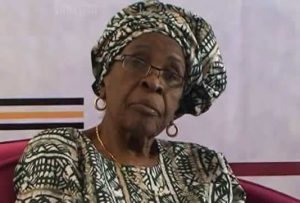
Photo: Professor Bolanle Awe
In the contemporary era, the legacy of these early contributors continues to reverberate. Though marked by challenges, the historical landscape lays the foundation for a nuanced understanding of the struggles, triumphs, and complexities that characterize African women’s research. African women have been at the forefront of activism both within countries on the continent and in the diaspora, championing causes that resonate with justice, equity, and empowerment. Through activism, they can marry the town and the gown, thereby extending their commitment to translating research and theory into tangible societal change and vice versa.
African women writers such as Buchi Emecheta, Chimamanda Ngozi Adichie, Mariama Ba, and Tsitsi Dangarembga, among others, have greatly contributed to the Afrocentricity of African literature and the positioning of African literature within global contexts and discourses. They also offered, and some of them continue to offer, critical insights into societal dynamics, challenging prevailing stereotypes and misconceptions.
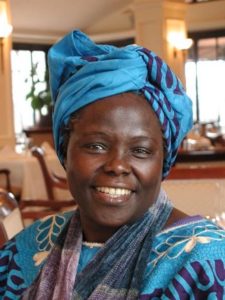
Photo: Wangari Maathai
In the sciences, the achievements of African women have been equally noteworthy: from Calestous Juma’s contributions to agricultural innovation to Francisca Nneka Okeke’s pioneering work in theoretical physics, there has continued to be ample proof that despite the visible limitations, research, and knowledge production among African women in academia will continue earnestly.
Yet, the progress has not totally shut out the limitations and challenges hindering the full participation of African women in knowledge production about the continent. Issues such as gender-based discrimination, institutional biases, and a lack of mentorship opportunities continue to militate against the growing resilience and commitment of these women. The intersectionality of gender and race, class, age, sexuality, socio-economic status, and geographical location further compounds these challenges, creating multifaceted obstacles that require nuanced solutions.
Access to funding and resources is also a significant hurdle despite the recent concerted efforts to increase funding opportunities for marginalized researchers. The global academic landscape, often shaped by Western norms and expectations, can be inherently exclusionary, necessitating a concerted effort to decolonize research methodologies and create spaces that accommodate diverse perspectives.
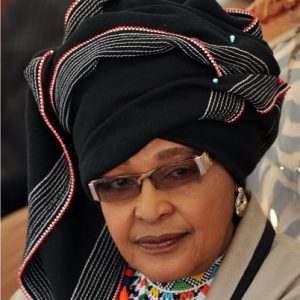
Photo: Winnie Mandela
The deployment of intersectionality is important to understand the subject. As Kimberlé Crenshaw argues, intersectionality allows us to pay attention to “overlapping systems of oppression” dependent on multiple social categories. For African women researchers, the intersectionality of gender, class, race, and other factors significantly influences their research agendas, methodologies, and the reception of their work.
African women scholars often navigate the delicate balance between academic pursuits and societal expectations related to domestic and community responsibilities. This tension necessitates a recognition of the unique challenges faced by women situated at various intersections, urging scholars and institutions to adopt inclusive practices that accommodate diverse experiences.
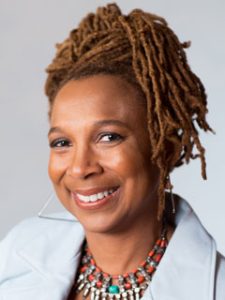
Photo: Kimberlé Crenshaw
There can be no full recognition of the contributions of African women to research and knowledge production without factoring in the work that has been done and is still being done in the global diaspora. The global diaspora contributes to shaping the landscape of African women’s research. Many African women scholars have ventured beyond the continent, seeking educational opportunities and contributing to global academia alongside African diaspora women descended from previous generations of forcibly dispersed Africans. The diaspora connection represents a two-way exchange, influencing both the scholarly endeavors of African women abroad and the academic landscape within Africa.
In Western institutions, African and Diaspora women scholars grapple with a dual consciousness — navigating the expectations and norms of their host countries while maintaining a connection to their African roots. Their research often bridges the gap between the global and the local, addressing issues that transcend geographical boundaries but remain deeply rooted in the socio-cultural contexts of Africa.
Diaspora scholars have significantly contributed to various disciplines, with their research bringing unique perspectives to issues affecting the African continent. The experiences of African women scholars in the diaspora exemplify the intersections of identity, migration, and knowledge production.
Beyond academic pursuits, African women in the diaspora actively engage in activism that reverberates back to the continent. Their roles as advocates, policymakers, and community leaders contribute to shaping the socio-political landscape of both their host countries and their countries of origin.
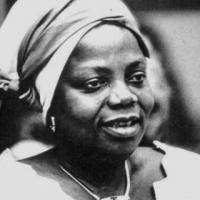
Photo: Buchi Emecheta
Diaspora activism often intersects with research agendas, creating a dynamic interplay between scholarly pursuits and advocacy. Issues such as migration, gender equality, and cultural representation become focal points, with African women scholars leveraging their positions to amplify marginalized voices and effect change.
The influence of diaspora activism extends to research collaborations and partnerships, where African women scholars abroad are seen to collaborate with colleagues on the continent, fostering a transnational dialogue that transcends traditional academic boundaries. These collaborations bring diverse perspectives to research projects, enriching the depth and breadth of knowledge production.
Although International Women’s Day was ten days ago, it would not be enough if we took the whole month of March to celebrate African women’s contributions to research, knowledge production, and activism within and outside the continent, much less it is enough time to celebrate women all over the world for their various contributions to their fields.

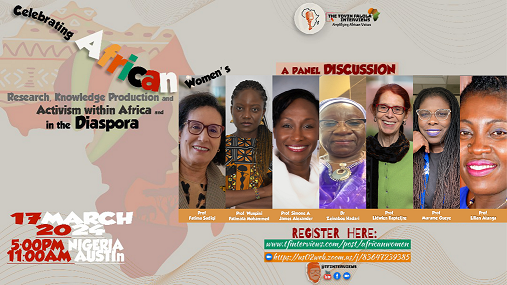












You must be logged in to post a comment.